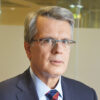On September 26 this year, AmChamGR will convene its 20th annual Corporate Responsibility Conference, titled Headwinds: Endure. Adapt. Persevere. Embrace the Changing Future of Sustainability.
To honor this anniversary, and working with CR Committee Chair Pakis Papademetriou and CR Committee Coordinator Angela Boyatzis, Business Partners reached out to some of the country’s leading Thought Leaders in corporate responsibility, inviting them to describe their position in the Greek sustainability ecosystem and share their thoughts on the most critical emerging challenges the industry faces today.
Read on for reflections on 20 years of CR Conferences by Committee Chair Pakis Papademetriou and to find out why we need to redefine our sustainability priorities, embrace change, and turn planetary and human needs into corporate purpose.
CR Conference celebrates 20 years
FACTS AND FIGURES
CR CONFERENCES
SPEAKERS
SPONSORS
PARTICIPANTS
| June 9, 2003 | 1st CSR Conference | Building Responsible Companies |
| June 3, 2004 | 2nd CSR Conference | Building Responsible Companies |
| October 10, 2005 | 3rd CSR Conference | Building Responsible Companies |
| June 5, 2006 | 4th CSR Conference | Building Responsible Companies |
| November 5, 2007 | 5th CSR Conference | Building Responsible Companies: Responding to Major Disasters |
| June 9, 2008 | 6th CSR Conference | Building Responsible Companies |
| June 4, 2009 | 7th CSR Conference | Building Responsible Companies |
| June 2, 2010 | 8th CSR Conference | Building Responsible Companies: Best Practices in Sustainable Development |
| June 1, 2011 | 9th CSR Conference | Building Responsible Companies: Maximizing Benefits from a Sustainable Supply Chain |
| June 7, 2012 | 10th CSR Conference | Building Responsible Companies: Solutions for a Better Tomorrow |
| November 18, 2013 | 11th CSR Conference | CSR at the Frontline: Redesigning Our Future |
| November 20, 2014 | 12th CSR Conference | New CSR Scenarios: Be Prepared |
| October 26, 2015 | 13th CSR Conference | Changing Mindsets Within the Boardroom: Fostering a Culture of Corporate Sustainability |
| November 3, 2016 | 14th CSR Conference | Redefining the CSR Vision: Innovate, Circulate, Engage |
| November 6, 2017 | 15th CSR Conference | Inclusive Cities and Engaged Citizens: Rebuilding Our Society Sustainably |
| October 31, 2018 | 16th CSR Conference | The World of a Better Tomorrow: Sustainability and the New Disruptive Era |
| November 7, 2019 | 17th CR Conference | We Are the Change Generation |
| October 19, 2020 | 18th CR Conference | Tribes: Joined by Purpose |
| September 30, 2021 | 19th CR Conference | Citizen Sustain: Building a Better Urban Future |
| September 26, 2022 | 20th CR Conference | Headwinds: Endure. Adapt. Persevere. Embrace the Changing Future of Sustainability |
| Sustainable Talks | ||
| June 14, 2018 | 1st Sustainable Talks | Plastic Dreams and Nightmares |
| November 22, 2018 | 2nd Sustainable Talks | As Food as It Gets |
| April 17, 2019 | 3rd Sustainable Talks | The Big Stem Theory |
| May 19, 2019 | 4th Sustainable Talks | The Growth Collaborative |
| September 16, 2020 | 5th Sustainable Talks | Cycling Friendly Business |
| September 28, 2020 | 6th Sustainable Talks | Care Is the Drug |
| April 26, 2021 | 7th Sustainable Talks | dreamcatcher.eco – The Future of Business Lies in Business that Cares for the Future |
| May 26, 2022 | 8th Sustainable Talks | Change for Climate and Biodiversity in the Urban Environment |

How to Fit 20 Years Into 300 Words
By Pakis Papademetriou, Head of ESG Division, Eurobank; Chair of the Corporate Responsibility Committee, AmChamGR
One should start by choosing the words wisely. After all, the “few simple words” approach has been the way of AmCham’s Corporate Responsibility Committee throughout these past twenty years. We have traveled great lengths in bringing out the essence of sustainability in simple and realistic terms, focusing on what really matters for people, planet and business.
We need to stay the course of few simple words. We need to keep transmitting a message of purpose and impact.
Since our first CR Conference, this Committee’s driving force has been the effort to communicate, educate and mobilize Greek business toward purpose-driven entrepreneurship. We have set the pace for a productive sustainability dialogue that has evolved from the humble sidelines to the center stage of business and government policy.
Twenty years of sustainability evolution have been a business journey like no other, bringing together people and businesses in a constructive cooperative-competitive congregation. From vaguely defined and disconnected tasks of corporate citizenship to social products and the notion of “care for the environment” and from there to CSR programs, sustainability strategies, materiality and links to global sustainability goals, connecting purpose with tribes, balancing impact, to integrating ESG factors in sustainable finance and climate risk. From small gatherings with blurry “responsibility agendas” to today’s CEOs addressing global conferences. And the journey continues with diversity and inclusion, nature-based solutions and biodiversity, planetary health, and a plethora of ESG topics.
As the dialogue continues, we need to stay the course of few simple words. We need to keep transmitting a message of purpose and impact, getting business, society and government aboard the same ship. Our anniversary 20th annual conference focuses precisely on the necessity of steadfast commitment against the fierce headwinds of covid-struck societies and war-triggered social and environmental crises.
Excellence lies in moderation. Sustainability is finally getting the business spotlight it deserves, and it is now our solemn duty to keep the discussion factual and in perspective.

Educating the Leaders of Tomorrow: How HEIs Promote Sustainability
By Rania Assariotaki, Senior Manager for Sustainability, Office of Public Affairs, The American College of Greece
Today, we are all living in turbulent times, and the clock is ticking as we approach the year 2030, the deadline for achieving the United Nations Sustainable Development Goals (SDGs).
Today’s students will be tomorrow’s leaders, the ones to provide solutions to global issues such as climate crisis, justice and equity. Some educational institutions currently provide general knowledge of the SDGs through traditional learning and teaching activities, but that’s not enough. Higher educational institutions must redefine their role so as to futureproof the leaders of tomorrow. This could be achieved through action-based learning, interdisciplinary programs and research and by infusing the necessary soft skills—such as adaptability, resilience, lifelong learning mindsets—and values into the curriculum in order to empower young people to become responsible citizens and business professionals.
Higher educational institutions must redefine their role so as to futureproof the leaders of tomorrow
This is the case with The American College of Greece (ACG). As a leading academic institution with a 360-degree approach to sustainability, ACG is committed to systematically addressing issues, from sustainability focus in academic programs and research and reducing its carbon footprint while improving its energy efficiency to enhancing its social impact and increasing transparency and accountability in its daily operations.
For all its relevant activity, ACG has earned a STARS Gold Rating from the Association for the Advancement for Sustainability in Higher Education (AASHE) in recognition of its sustainability achievements and best practices in five categories: Academics, Engagement, Operations, Planning and Administration, and Innovation and Leadership. ACG is the only academic institution in Greece to have received a distinction from the internationally acclaimed AASHE. Because ACG Cares!

Leading the Way Toward a Sustainable Future
By Aphrodite Avramea, Group Head of Strategy, ELLAKTOR Group
Active contribution to and substantial promotion of sustainable development must be at the core of any leading enterprise’s activities and must include a methodical and effective approach to ensuring a safe and fair working environment, substantial support not only for the economy but also for local communities, and a conscious and systematic reduction of the environmental impacts of its activities. At ELLAKTOR Group, these commitments are core values that guide the fulfillment of the Group’s mission. They are expressed through modern infrastructure projects that upgrade people’s quality of life as well as environmental and energy projects that promote the circular economy and energy production through alternative and renewable sources, whilst, at the same time, creating added value for the Group’s stakeholders.
substantial promotion of sustainable development must be at the core of any leading enterprise’s activities
As one of the largest infrastructure groups in Greece and southeastern Europe—with an international presence and a diversified portfolio focusing on construction, concessions, environment, renewable energy, and real estate development—ELLAKTOR Group combines its 70 years of history with the experience and knowhow of its 7,291 employees, as well as with innovative practices, to lay the necessary foundations and lead the way toward a modern, innovative, secure and sustainable future. In 2021, the Group proceeded to the evaluation and redefinition of its strategic priorities and goals, to respond not only to critical emerging challenges but also to the unstable social and natural environment. In this context, the Group’s Sustainable Development Policy was updated, an ESG Committee was formed, and a new strategic framework was designed so as to embed environmental, social, and governance (ESG) best practices across the organization.

Wildfires: A Symptom of Climate Change
By Rouli Christopoulou, Head of Corporate Responsibility, Alpha Bank
2021 was by far the worst of the last 13 years in terms of total burned area in Greece, with 84 mapped forest fire incidents burning a total area of 1,300,000 acres. Yet catastrophic wildfires globally could increase by a third by 2050, according to a 2022 UN Environment Program report. The report, Spreading Like Wildfire: The Rising Threat of Extraordinary Fires, describes a worsening cycle in which climate change-induced droughts and heatwaves increase the likelihood and severity of wildfires, which in turn release more climate-changing carbon into the atmosphere as they burn through forests and peatland.
Catastrophic wildfires globally could increase by a third by 2050
At Alpha Bank, as part of our Sustainability Program, we implement initiatives to mitigate climate change and support the prevention and handling of natural disasters in Greece. To reinforce the country’s firefighting capabilities, we donate equipment to the Hellenic Fire Service and firetrucks to volunteer firefighters associations operating in the most affected areas. Furthermore, we mobilize customers and partners to contribute to ecosystem restoration and biodiversity protection. In collaboration with Reforest’Action and the Forest Research Institute of Thessaloniki, we introduced impact investments in the Greek market, by offering our clients the opportunity to fund the reforestation of Aronas forest in Katerini with 17,379 trees in 2021, rising to 30,000 by the end of 2026. We are also supporting the University of Athens MSc in Environmental, Disaster and Crisis Management Strategies, aiming not only to the optimal management of catastrophic fires but also to the formation of a qualified community of scientists who will contribute to the prevention of new disasters, acting as agents of information for citizens and the government.

Leading by Example: Carbon Neutral by 2027
By Dimitra Daskalaki, Organizational Development and Communications Director, METRO
Actions speak louder than words, and that’s why when it comes to sustainability, leading by example is the best way to change mindsets. With this in mind, Metro, a wholly Greek company and key player in the country’s retail and wholesale market under its brands My market and METRO Cash & Carry, identified and committed to a set of ambitious sustainability goals backed by a significant investment plan, and since 2015, we have steadfastly followed a focus driven sustainability program designed to gradually reduce our carbon footprint, achieving tangible results at every step, and aiming at becoming carbon neutral by 2027.
Metro is committed to a set of ambitious sustainability goals backed by a significant investment plan
The last few years have seen an investment of €62 million in our stores around Greece, to replace refrigeration, lighting and airconditioning systems, with state-of-the-art environmentally-friendly and energy-efficient units. To date, this has resulted in a 37% average reduction in energy consumption, which corresponds to the annual electricity consumption of 23,580 households. Meanwhile, in new stores, the installation of such innovative systems has achieved a reduction of energy consumption that equals the impressive 48%, when compared to the respective conventional stores. And by 2023, we plan to have installed 97 photovoltaic stations, with a total capacity of 25MW, on the roofs of our shops and distribution centers, resulting in 30% of our energy requirements being covered by our own renewable energy systems.
Our commitment and efforts have earned us numerous accolades in recent years, and we are proud to be recognized as “Energy Efficient Company of the Year” for 2022 and 2019 and as “Energy Excellence of the Year” for 2020, along with 45 more awards and distinctions.

The Role of Business in Achieving the UN SDGs
By Sophie Daskalaki-Mytilineou, Chair of the BoD Sustainability Committee, MYTILINEOS
As the sustainability issue becomes clearer in our minds, we realize the extent to which it is a teamwork of all stakeholders in society. Businesses have their own stressed role in the achievement of the United Nations Sustainable Development Goals as they strive for economic growth while ensuring a balance with environmental care and social wellbeing.
Sustainability is a teamwork of all stakeholders in society
At Mytilineos we redefine sustainability, specifying the relevant SDGs to our activities and finding ways to contribute to their achievement, following six major perspectives: (1) Tackling climate change by undertaking concrete initiatives to reduce CO2 emissions by 2030 and achieve net zero by 2050. (2) Supporting innovation and sustainable industrialization through investing in the circular economy and the application of clean industrial practices; at the same time, it steadily enhances employability in the domestic industrial sector and creates the conditions for a responsible supply chain. (3) Committing to protecting the natural environment with specific investments in production process upgrades, implementing the best available techniques and certified management systems. (4) Promoting safe and productive employment and adopting a prevention-oriented approach alongside the integration of policies and practices to enhance the creation of decent jobs for all. (5) Promoting the reduction of inequalities by enhancing the participation of women and the inclusion of young workers in its workforce as well as its effort to integrate people with disabilities into the labor market. And (6) consistency in social responsibility by implementing specific programs and initiatives aiming to enhance our harmonious coexistence with our local communities and society at large.

Looking Forward to Weather Headwinds
By Dimitrios Dimopoulos, Head of ESG, Piraeus Financial Holdings
Sustainability is a long journey on a bumpy road with strong headwinds and lots of challenges. To stay the course, we must adhere to our sustainability goals with clear vision and determination and not allow daily adversities to sidetrack us. Today, we are up against strong headwinds in the form of the pandemic, war in Europe, the ongoing energy crisis, and volatile food prices. Addressing these urgent challenges must not dampen our overall sustainability efforts.
We must accelerate our actions to ensure a healthier planet and to support a just and vibrant society and economy
On the contrary, we should interpret these adversities as a strong signal that we must accelerate our actions to ensure a healthier planet and to support a just and vibrant society and economy. Climate change and biodiversity loss are wreaking havoc on societies and economies the world over. We need to press for more stringent and concerted efforts to decarbonize and regenerate nature if we want to reach our 1.5°C target by 2100. Governments, international organizations and the private sector need to further coordinate and step up efforts toward sustainability. The banking sector will have a leading role to play by co-financing the transition to a low carbon economy.

Insurance Going Green
By Chryssa Eleftheriou, Sustainability and Stakeholders Relations Leader, Interamerican
A firm commitment to offering modern transportation solutions that improve the quality of life in cities has found a new expression in the first green car insurance program in Greece. Launched by Anytime by Interamerican, the country’s most popular direct insurance brand, the Short Drive insurance policy was created for lower mileage drivers; it features the company’s Buy The Mile system and uses telematics to encourage its customers to limit the use of the car, thus contributing to the protection of the environment. Six years after the innovative policy’s original introduction, Anytime evolved Short Drive into the country’s first green car insurance plan, staying true to its consistent vision of working toward sustainable and safe cities.
Carbon offsetting aims to compensate for emissions by achieving a reduction in carbon dioxide or greenhouse gas emissions from an activity or project taking place in another area
Through international-standard certified carbon offsetting projects, Anytime, on behalf of its customers, compensates for the CO2 emissions generated by their cars, turning any route “climate neutral” for the duration of their insurance plan. Carbon offsetting aims to compensate for emissions by achieving a reduction in carbon dioxide or greenhouse gas emissions from an activity or project taking place in another area and generating carbon offset credits. Anytime’s initiative includes the direct emissions of greenhouse gases (Category 1 – Scope 1) resulting from vehicles, as defined by ISO 14064-1: 2012 and the GHG Protocol. These greenhouse gas emissions are not company emissions but direct emissions of insured vehicles. By adopting the United Nations Sustainable Development Goal 13 on Climate Change, the people of Anytime are committed, through the insurance solutions they provide, to support the common effort toward a sustainable future.

Equity: A Key Priority for Global Health
By Antonis Fousteris, Senior Manager Policy and Public Affairs, Corporate Affairs, Pfizer Hellas
During the pandemic, we managed to think outside the box and make the impossible possible: To help tackle Covid-19, scientists developed a vaccine in just nine months and a treatment in 18, which would previously have taken years, and Pfizer manufactured and shipped more than three billion doses of its Covid-19 vaccine to nearly 180 countries and territories around the globe in just one year. However, the pandemic also highlighted the complexity and inequities of access to quality healthcare.
It is time for all companies to reset their priorities and commit to making the world a better place to live in
Everyone regardless of income or geography shares the same rights to safe high-quality healthcare solutions, and we will do our part to contribute to this. Recently, Pfizer announced the “Accord for a Healthier World” and committed to providing all current and future patent-protected Pfizer medicines and vaccines available in the US or EU on a not-for-profit basis to 45 lower-income countries. The Accord seeks to close the health equity gap for 1.2 billion people around the world by addressing systemic barriers to access to innovative medicines and vaccines. In this scope, Pfizer in Greece has been working relentlessly to reduce health inequalities, by collaborating with patients, NGOs and other organizations that support vulnerable groups. Our focus and plan on equity earned Pfizer Hellas the Diamond award, the highest distinction by the Corporate Social Responsibility Institute, for our Corporate Social Responsibility strategy.
Our world needs new and brave ways that will help us create an equal society with better health and a better future for all people around the globe. It is time for all companies to reset their priorities and commit to making the world a better place to live in.

It’s Not Only About the Planet!
By Ada Gianneskis, Communications Director for Greece, Cyprus and Bulgaria, Ikea
Back in 1987, Gro Harlem Brundtland defined in one phrase the very essence of sustainable development as “development that meets our needs of the present without compromising the ability of following generations to meet their own.” It sounds simple in theory. It is often more than a challenge to put the right idea into practice. The recent inhumane conflict in Ukraine has not only ascertained the claim but has also redefined the priority agenda in a negative sense. Shockingly enough, the energy crisis threatens global food security. In fact, besides overturning the environmental agenda, it has effectively undermined the green ethics code in Europe and beyond.
A sustainable society is not only a climate efficient one—it is also a humancentric one
Hold your horses out there. Is that our major problem? Is this all about the sustainable world we strive for? Hardly so. A sustainable society is not only a climate efficient one—it is also a humancentric one. Environmental considerations ought to be on a par with social considerations. In layman’s terms, this means better quality of everyday life. Forget the ESG corporate mumbo jumbo. Civil society thrives on respect for human rights. It breathes transparency and exhales democracy. It feeds on inclusivity and yields diversity.
The Ukraine conflict unraveled many stereotypes regarding our sustainable list of “musts.” Most importantly, it unveiled the fragile status of dignity and welfare in modern European societies. So next time we start a public dialogue about sustainable paths and just transitions, let’s give people the salient place they deserve in our common effort for a better world.

Lessons Learned from Crises
By Vasiliki Kapari, HR Manager, Wella
Amid hectic times of deep humanitarian crises—war in our EU neighborhood, the pandemic, severe isolation, food, energy and financial crises, and climate change—there is no benefit in crying over spilled milk. Instead, society needs to be bold with the lessons learned.
Societal bonds have been proven to be of ultimate importance
Russia’s invasion of Ukraine has forced millions, mostly children and women, to flee the country and seek shelter. Almost half of those fleeing are minors and in need of enhanced protection, as they run a bigger risk of falling victims to trafficking and exploitation. During this humanitarian crisis the European Parliament, its Coordinator on Children’s Rights and international humanitarian communities quickly mobilized efforts and resources to provide support and defend the rights of the children fleeing the war.
Isolation and digitalization were both accelerated by the pandemic. The impact on digital illiterates, low-income households and the elderly has been immense. Those unable to access civil procedures and banking services or maintain connectivity with the outside world, as well as the growing number of unemployed with no digital skills, were all taken by storm, helpless to respond. Again, numerous initiatives and collective efforts appeared and made digital literacy in our country the new reality.
Shocking news on violence, at home or in the streets, caught society off guard. Psychologists have been warning of massive PTSD, anxiety, depression, and other symptoms of distress. Social distancing and security measures have affected the relationships between people and their perception of empathy toward others. Societal bonds have been proven to be of ultimate importance, an aspect often undervalued in psychological wellbeing. The waves for awareness and alert mechanisms will prove to be of vital importance for a balanced humancentric future.

Passion for Energy
By Filippos Karamanolis, General Manager, Head of Central Services and Operations, Eurobank
Businesses can support longterm prosperity by financing sustainable development while delivering value to all stakeholders and having a positive impact through all aspects of their activities. This is our aim at Eurobank, where ESG goals are essential to our business strategy across the full spectrum of our financing and operational activities. As a key measure of our ESG success, Eurobank’s operational environmental performance focuses on reducing energy consumption and greenhouse gas (GHG) emissions. In the past eight years, we have demonstrated significant achievements, with an almost 40% decrease in energy consumption and a 47% reduction in GHG emissions. Notably, Eurobank was the first bank in Greece to certify its carbon footprint per ISO 14064, confirming our steadfast commitment to protecting the natural environment (see the 2021 Environmental Report).
simple, everyday habits can develop an energy-conscious culture across our society
In view of the growing threat of the climate crisis, further compounded by the impact of the war in Ukraine and the skyrocketing energy costs and a forced retreat to fossil fuel energy, Eurobank is placing special emphasis on our employee energy usage culture, alongside the numerous energy efficiency initiatives at a corporate level (such as our Journey to Cloud, LEED certifications for buildings, upgrading of a/c equipment and lighting). This summer we launched a bank-wide energy-saving campaign that nurtures a stewardship culture at both the office and at home, focusing on a/c temperature setpoints, turning off lights, best use of natural light, etc. At a time when the path to Net Zero becomes a major challenge for corporations, we believe in being continuously reminded of the simple, everyday habits that develop an energy-conscious culture across our society, contributing to longterm sustainability for all.

On Leading with Purpose
By Elina Konstantinou, Marketing and Communications Director, Zepos and Yannopoulos
Driven by the need to redefine sustainability priorities, we aspire to use whatever influence we have to make a positive impact on those around us; not simply our clients and peers, but society in general. We aim to play our part for the community, by paying our share of taxes, showing zero tolerance for corruption, upholding human rights throughout our supply chain and, primarily, by being a fair employer.
being a responsible business requires transparency, ethics, accountability and trust across all levels
We have placed purpose at the core of our business strategy, with the strong belief that being a responsible business requires transparency, ethics, accountability and trust across all levels of interaction with our people, clients and community. Earlier this year we published our first report on who we are and the footprint we leave behind; making it a first in our industry in Greece. From pro-bono work to advocacy, at Zepos and Yannopoulos we consider it our duty to speak out on issues that concern society as a whole and for which we have the privilege to have expertise. Equally, our strategy on giving back reflects our sense of responsibility toward society. We partner to support children in need, widen access to education, and assist cultural organizations that are part of our country’s heritage. At the same time, we aim to soften our environmental footprint by adopting energy-saving and recycling policies. Contributing part of our yearly profits to good causes, we believe we can create value for society by addressing its needs with energy and compassion. While we grow and generate profit, our efforts also focus on creating shared value, prioritizing connections between societal and economic progress, and demonstrating sensitivity to community concerns and challenges.

Priority #1 – Ecosystems Redefine the Sustainable Future of Health
By Theodore Liakopoulos, Managing Director, Johnson & Johnson MedTech Greece and Cyprus
Going through the Fourth Industrial Revolution, sustainability is the most crucial strategic factor that leads the way forward. More importantly, after the pandemic and its unpredictable crisis effects on healthcare, redefining sustainability is the number one business priority. Simple as it is, if we want to exist, we need to change, but if we want to thrive, we must change over again.
If we want to exist, we need to change, but if we want to thrive, we must change over again
Looking toward the future, we clearly see that sustainability is equalized with agility, flexibility, resilience, and innovation. Organizations could scale responsible growth and elevate the power of sustainability by using the benefits of technology and workforce engagement. Since sustainability is the question, technology-driven solutions could be the answer that highlights a digital path to a more sustainable future.
At Johnson & Johnson MedΤech Greece, we reimagine the future of health by uniquely positioning to innovate the next generation of digital solutions in healthcare. We are committed to creating profound value and impact in the health journey by unleashing breakthrough innovation to transform each aspect of how we experience care. Our smart care solutions create a digital healthcare delivery ecosystem that empowers hospital care, engages patients and stakeholders, enables the operating room, meets the high standards of health data privacy security and compliance, delivers hospital operation excellence, and redefines care delivery models.
We are dramatically accelerating the need to re-envision the future of health. Our focus is to foster the rise of healthcare systems through digital ecosystem environments. Our goal is to empower every human to live their best life possible. Together, we will go beyond what’s next to positively impact the future for humanity.

A Place for Greece in the Green Economy
By Dr. Panagiotis Mourgos, Managing Director, Texan Envipco Hellas Group
Recycling in the context of a green economy is a one-way street for all future generations. It is a social necessity in order to reduce climate change and improve our conditions of living. The key component of recycling is the rescue of a material that, while it has been used and seems useless, has not lost its value and can be used for much longer. Therefore, instead of rejecting it in the environment, recycling returns material to the economic cycle, contributing to environmental protection, saving raw materials, reducing electricity consumption for the production of new packaging, improving the national economy’s fundamentals, creating jobs, and preventing air and water pollution.
Recycling returns material to the economic cycle, contributing to environmental protection
Texan has held a leading position in the packaging recycling sector since the 1980s through the placement, operation and integrated management of automated state-of-the-art technology recycling machines. In 2019, Texan and Envipco joined hands and invested in environmental protection, establishing in Greece the 1st plant outside of the US for the production of rewarding recycling machines and making Greece a central hub across Europe. The official opening was met with great success and graced by the presence of Prime Minister Kyriakos Mitsotakis and then US Ambassador to Greece Geoffrey R. Pyatt.
Respecting the principles and values of our culture, at Texan we practice corporate social responsibility and aim to improve our community. Therefore, we implement the unique and innovative Integrated Corporate Social Responsibility Program and donate €1,000,000 to strengthen important actions for the environment, education, health, and the local community.

Health for All – Hunger for None
By Sonia Mousavere, Head of Communications and Public Affairs, Bayer Hellas
Advancing life—that’s what we at Bayer are all about. We put ourselves to the test day in, day out. All together. All over the world. With enthusiasm for new ideas, we place science at the quest for a better life.
We promote inclusive growth and responsible use of resources to help people and planet thrive
Bayer is a life science company with a history of more than 150 years worldwide and a continuous presence in Greece for more than 65 years. With the innovative products of our leading businesses in health and agriculture, we are contributing to solutions developments addressing some of the major challenges of our time and ensuring sustainable development. Sustainability is by default one of our core values and a core element of Bayer’s corporate strategy. Guided by our vision, “Health for all, hunger for none,” we promote inclusive growth and responsible use of resources to help people and planet thrive.
Inclusive growth is translated to providing more people worldwide and in Greece with access to healthcare and food security and devising solutions to environmental protection, decarbonization, climate adaptation, and biodiversity preservation. Our products, services, innovative prowess, and collaboration with distinguished partners in Greece, enable us to contribute significantly toward meeting the United Nations Sustainable Development Goals, by providing healthcare (SDG 3), focusing on empowering women (SDG 5), working on the availability and sustainable management of water for all (SDG 6), further reducing greenhouse gases along our value chain and building resilience toward the impacts of climate change (SDG 13), and protecting life on land (SDG 15). Our efforts have received recognition, as for example our Holistic Support Program during the catastrophic fires of August 2021 which was awarded at the Bravo Sustainability Awards 2022.

A Committed Brand
By Sotiris Pastras, Sustainability and Corporate Responsibility Manager, Apivita
Reaching the European Green Deal goals will not be possible without reshaping our energy approach; this is where most of our emissions are generated and where change needs to happen first, to make it possible elsewhere. The first step toward achieving carbon neutrality by 2050 is to meet the 55% emission reduction by 2030. But how can we achieve this goal? Only 12% of our total greenhouse gases (GHGs) come from our own operations. In contrast, 88% come from our supply chain. Therefore, we’re transforming our business model and working throughout our supply chain to help achieve absolute reduction in Scope 3 emissions.
The first step toward achieving carbon neutrality by 2050 is to meet the 55% emis-sion reduction by 2030
The Puig 2030 ESG Agenda (Apivita has been a member of Puig Group since 2017) is enforced internally through six pillars, each covering specific high-materiality areas within climate and nature: product stewardship, sustainable sourcing, responsible logistics, nature stewardship, responsible manufacturing and facilities, and conscious living. The six pillars are deployed through 16 specific programs tackling the most relevant sustainability topics in the industry.
In 2018, Apivita became the first Greek company to receive B Corporation certification, becoming a member of an international network of companies and organizations that aspire to combine entrepreneurship with social welfare and use the power of markets to solve social and environmental problems. Two months ago, we proudly announced that we have been re-certified as a B Corp with an outstanding overall score of 117.2 points. Since 2021, we have also been a proud member of 1% for the Planet, a network of brands and nonprofits working to make the world a better place.

Embracing People / Embracing Change
By Melina Thomaidou, Communications and Patient Relations Manager, AbbVie
We need to reimagine our comfort zone, reinvent ourselves and redefine our eco-systems
Headwinds will always be part of our lives. They may temporarily change our course, but they cannot hinder us from evolving or stand in the way of our end destination. Current challenges, from environmental to health and from economic to societal, are changing the world as we know it. We, as individuals and as professionals, need to reimagine our comfort zone, reinvent ourselves and redefine our ecosystems with mental strength, courage, and eagerness. At AbbVie we make it our purpose to advance health, prosperity, and innovation. With our standards of work, no turbulence can estrange us from our path. Our mission is strong, and we are dedicated to fulfilling it for the wellbeing of our patients, the growth of our employees, the strength of our communities, and the resilience of our business. We realize that we are all part of a chain that initiates reaction. And we strongly believe in a positive reaction that fosters the cohesion of the society and the people. Our mindset is to embrace change and transform lives for the better.
Our key to unlocking change is people. We treat everyone equally, with dignity and respect, and we welcome diverse backgrounds and perspectives to achieve better health and prosperity for society and the people. We value human life, we practice good citizenship, and we are committed to transforming it into good business with integrity, resilience, and ethics to ultimately achieve a remarkable societal impact.

Tackling the Climate Crisis
By Maria Tzelepi, Public Affairs, Communications and Sustainability Manager, Greece, Cyprus and Malta The Coca-Cola Company
With our environmental, social and governance priorities fully embedded in our business and the way we work, at Coca-Cola we are focused on areas where we can have a measurable, positive impact on the communities we serve around the world.
Following the devastating fires of August 2021 that burned 12% of Greece’s forest area, we, Coca-Cola in Greece, took prompt action for providing immediate relief and longterm support to the local community, contributing to efforts to tackle the climate crisis.
Staying true to our sustainability leadership and ESG commitments, we developed a two-phase approach to community support: immediate relief in August 2021 in partnership with Bodossaki Foundation and a recovery plan in November 2021 in collaboration with the Greek Ministry of Environment.
we are focused on areas where we can have a measurable, positive impact on the communities we serve
In August, we provided support to the Hellenic Fire Service and humanitarian aid to survivors of the fires in Evia, and we also donated products to firefighters and volunteers in the field, through a total donation of €200,000. In November, we donated €1.8 million through the Ministry of Environment’s e-dorees platform, toward anti-corrosion works in Varibobi, Northern Athens, as a preventive anti-flooding measure that will protect Attica as a whole. The recovery donation has restored 7,500 acres of forest and the works were finalized in March 2022, rehabilitating in record-time the impacted areas and creating tangible impact with scale for the community we operate in.

Instilling Resilience Into Our Future
By Anna Vasila, Head, Sustainability and Industry Affairs, Athens International Airport
Four years after Greta Thunberg took the podium at COP24 and stressed that “if solutions within the system are so impossible to find, maybe we should change the system itself,” and following the unprecedented impact of the pandemic, we are today in a position to state that we indeed attempted to redefine ourselves, the way we think and make decisions.
We need to talk to the 20-somethings and actually listen, to bring civil society’s earnest voices into the decision making
In an environment of extreme volatility, Athens International Airport (AIA) managed to maintain business continuity and liquidity upon the pandemic outbreak, and just one year later, amidst a turbulent 2021, achieved a return to growth, attesting its resilience.
With the war in Ukraine continuing and with its secondary impact on fuel and energy costs, inflation and disposable income of travelers, as well as the tourism and aviation markets, this year AIA began work on the construction of a 16MWp photovoltaic park, the first major step toward our Route 2025 commitment to achieving net zero emissions by 2025.
We have realized that the ability to drive longterm shareholder value is dependent upon how well we serve our clients, manage our people and support our stakeholders, including the communities in which we live and work. At this critical juncture, through synergies and with the aid of technology, we could build a systematic and forward-thinking set of actions to improve the system for all. Toward this end, we need to ask the right questions. We need to talk to the 20-somethings and actually listen, to bring civil society’s earnest voices into the decision making. With COP27 ante portas, governments and the private sector stand together to mitigate the risks that the black swans bring along to disrupt the foundations of society, economy and environment.






